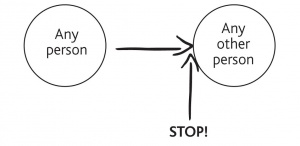s human beings, boundaries define us as individuals and we define ourselves by our relationships. They are there to be respected, not to be avoided. Without crossing boundaries there would be no human interaction, and mankind would become robotic. The mutually agreed crossing of personal boundaries leads to true intimacy. This is not restricted to sexual intimacy, but extends to any friendship or personal relationship.
Establishing, or re-establishing, boundaries can help us find solutions to problems that have arisen because boundaries have been crossed. Renegotiating the extent or content of boundaries is a significant aspect of relationships that grow in depth and meaning. Redefining boundaries doesn't necessarily mean the inclusions become less and the circles smaller. Boundaries can also be enlarged as familiarity develops and with it a greater tolerance so we can allow each other more freedom within the relationship.
The mutually agreed crossing of our personal boundaries leads to true intimacy
The mutually agreed crossing of our personal boundaries leads to true intimacy, whatever the nature of the relationship. However, when those two circles overlap it carries the potential for discomfort to develop. The idea here is not to avoid such interaction, but to be aware of the pitfalls when making the decision to step into someone's personal zone, even when invited.
This awareness makes it easier to pull back when necessary by simply acknowledging that boundaries have been crossed. Sometimes it may have been an invisible line you've inadvertently overstepped, and the other person has decided to point that out to you. A common reaction is to take such a reaction against boundary crossing as a personal attack. But it's not personal against you. It's personal for the person who feels their line has been crossed, and who feels their space has been invaded. It's their vulnerability that's been threatened and provoked their reaction, not yours.
Rather than judging, simply acknowledge that someone claims back their ground. If you don't like it, pull back as well, and the overlapping circles become separate again. That's your option, your choice.
Respect for boundaries
My right to act as I wish has one boundary: it stops at the tip of your nose.

I have to respect my own boundaries as much as I have to respect yours, and vice versa. My reaction to your actions does not comprise my right to demand you change what you've done, said, or otherwise expressed, if done in a non-violent way. Otherwise it's an assault and I have to protect myself. My demand for your apology implies my opinion is correct, and you're wrong, based on my judgment. I'm not referring to the Can I get some respect around here or I deserve respect kind of respect. This is the What right do I have to demand that you're different from who you are just to please me? variety of respect.
While we may be inclined to accept boundaries as a concept, the next hurdle is to have respect for their extent and content. Since these boundaries define a person, it implies having respect for everything that person values, thinks, says, does or feels. Unfortunately that's often quite different from what we want them to think, feel, say, do or value.
Of course, that respect doesn't equate to condoning or agreeing with everything people say or do. I still have the right to strongly, but respectfully, disagree. Call it the right to be stupid - but who's the judge?
Recognizing and respecting boundaries as the outer limits of another person's rights creates predictability. Although we may not necessarily like the nature of the boundaries and what they prevent us from doing, we inherently appreciate their existence. They allow us to relax. They determine what we can do, even when questioning or ultimately transgressing them, they provide our identification as 'law abiding' or 'outlaw', which without boundaries would not be possible.
They may give us comfort in knowing we 'belong' to a particular group, or define our difference as to who we are in relation to others.
I Power The Freedom to be me by George Dieter Published by Exisle Publishing



